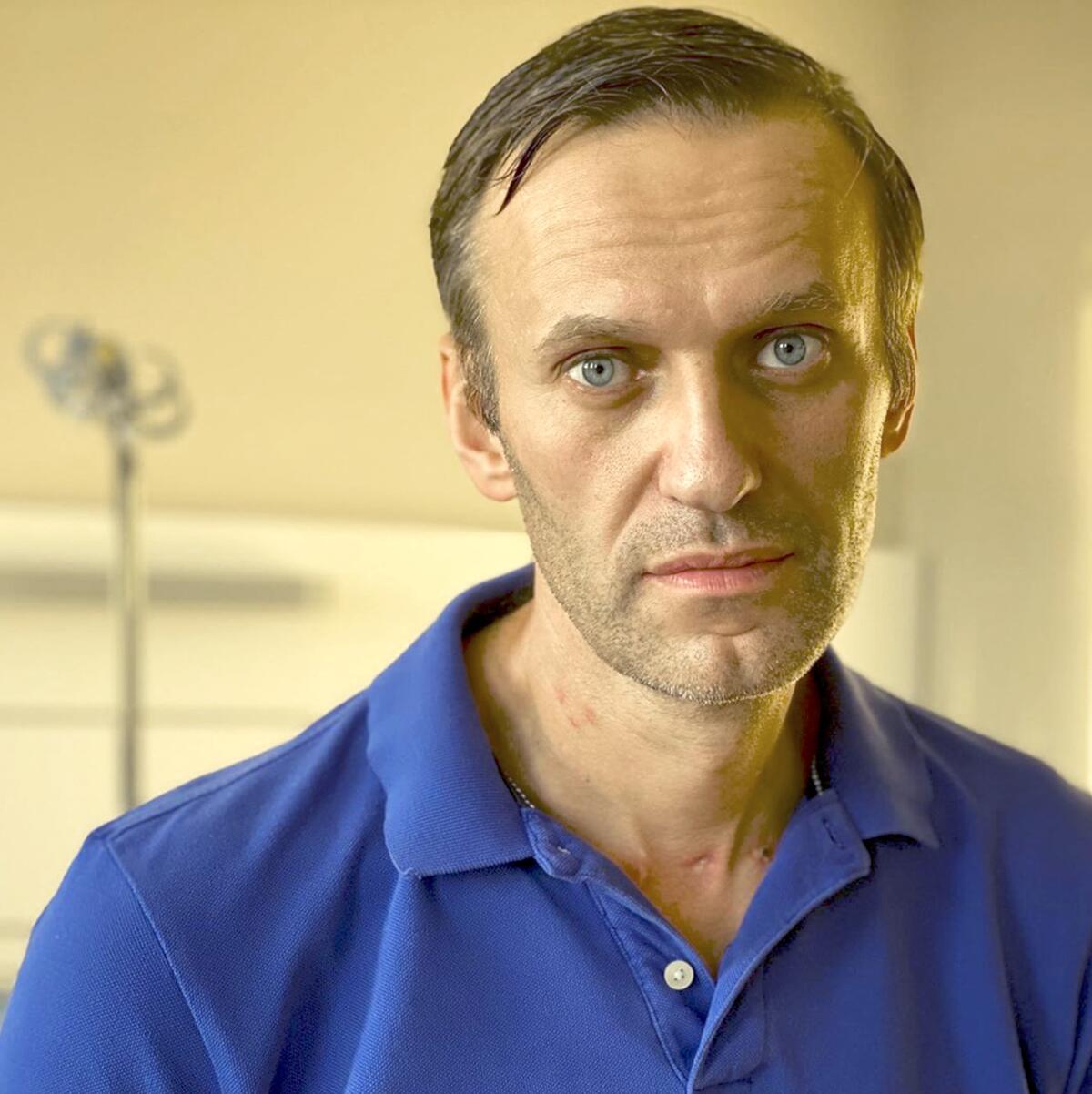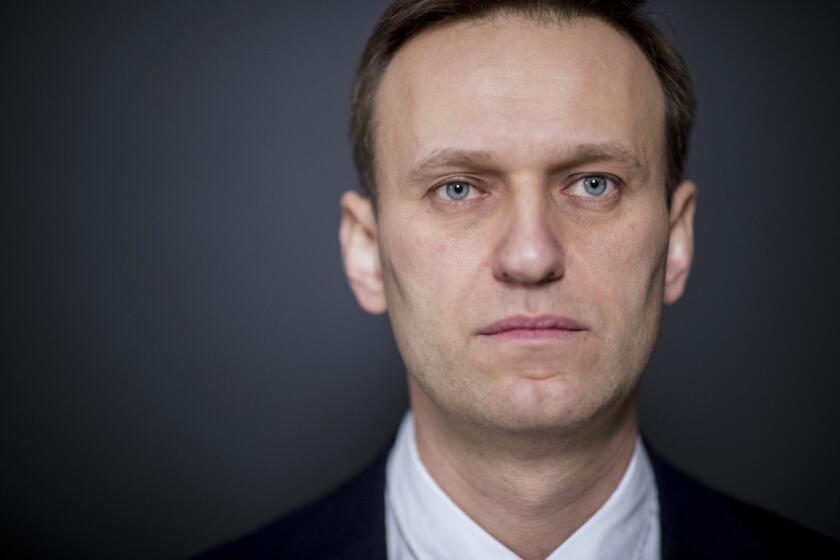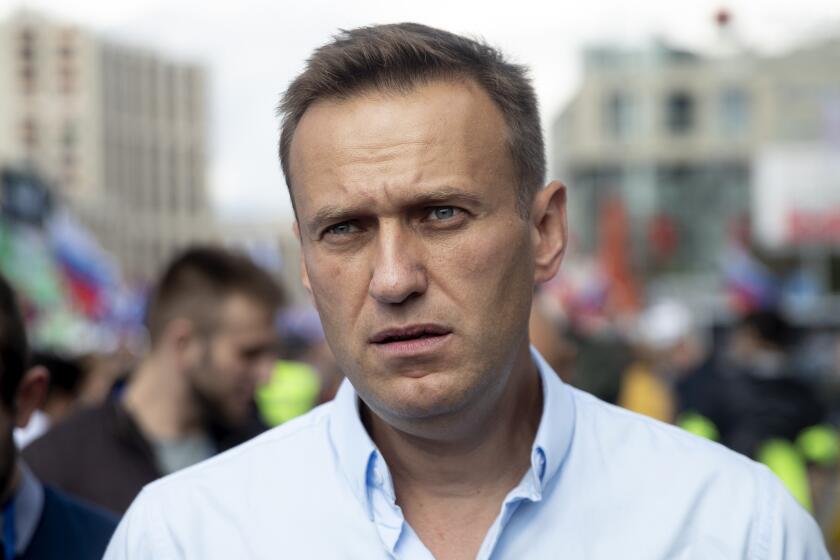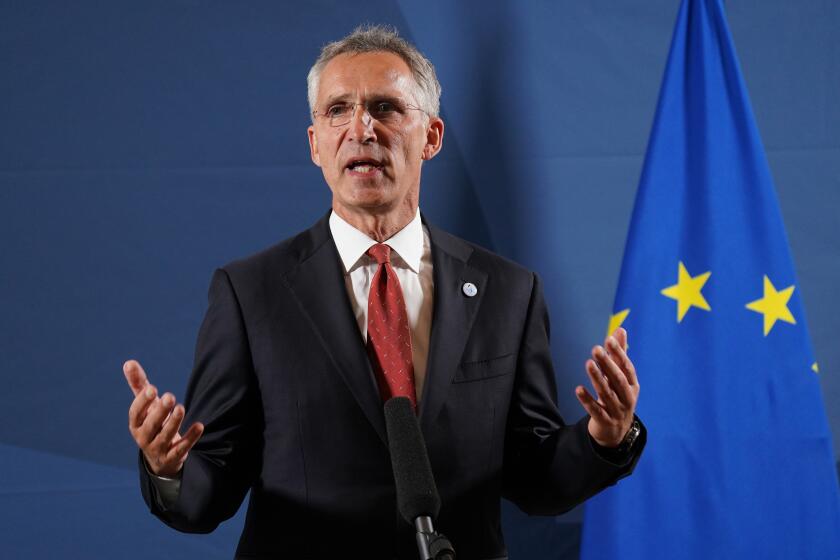Russian dissident Alexei Navalny released from German hospital after 32 days

- Share via
BERLIN — The German hospital treating Russian opposition politician Alexei Navalny said Wednesday that his condition had improved enough for him to be released, and suggested that a “complete recovery” from his poisoning by a lethal nerve agent was possible.
Navalny, 44, spent 32 days in treatment in Berlin’s Charite hospital, 24 of which were in intensive care, before doctors deemed his “condition had improved sufficiently for him to be discharged from acute inpatient care.”
The hospital said that, based on Navalny’s progress, the physicians treating him believe that “complete recovery is possible,” but added that it ”remains too early to gauge the potential long-term effects of his severe poisoning.”
Navalny, the most visible and vocal domestic opponent of Russian President Vladimir Putin, was flown to Germany two days after falling ill Aug. 20 on a flight within Russia.
German chemical weapons experts have determined that he was poisoned with the Soviet-era nerve agent Novichok — findings corroborated by labs in France and Sweden.
It was the same class of Soviet-era agent that Britain said was used on former Russian spy Sergei Skripal and his daughter in Salisbury, England, in 2018. German Chancellor Angela Merkel and other world leaders have called on Russia to investigate fully.
The attack on Alexei Navalny — at least the sixth such attempt against a Russian dissident in the last five years — has provoked international condemnation on a scale not seen since the poisoning of former double agent Sergei Skripal.
Navalny was kept in an induced coma for more than two weeks as he was treated with an antidote. Members of his team accused the Kremlin of involvement in the poisoning, charges that Russian officials have vehemently denied.
During his convalescence, Navalny has in recent days been posting regular photos from the hospital on Instagram, first showing him sitting up in his bed surrounded by his family, then up and about in the building.
In a wry post Tuesday night accompanied by a closeup photo, he laughed off a report in the French newspaper Le Monde saying that Putin suggested to French President Emmanuel Macron in a call that Navalny “could have taken the poison himself.”
“Good theory, I believe it deserves the most careful attention,” Navalny wrote in Russian. “Cooked Novichok in the kitchen. Took a sip from a flask on the plane. Fell into a coma.”
Past example shows that falling afoul of Putin can portend poison peril
He added sarcastically that the “ultimate aim of my cunning plan” was to die in Siberia. “But Putin outmaneuvered me. You can’t fool him,” Navalny wrote. “As a result, I lay in a coma for 18 days like a fool, but didn’t get my way. The provocation failed!”
Kremlin spokesman Dmitry Peskov said Wednesday that Le Monde’s story on Putin’s conversation with Macron was “inaccurate in its reported wording,” but he refused to identify what was inaccurate. Macron’s office declined to comment on the report.
Russia has bristled at the demands for an investigation, saying that it needs Germany to share medical data or compare notes with the Russian doctors who maintain that there was no trace of poison in Navalny’s system while he was at a hospital in the Siberian city of Omsk.
Germany has noted that Navalny was in Russian treatment for 48 hours and that Russia has its own data.
Breaking News
Get breaking news, investigations, analysis and more signature journalism from the Los Angeles Times in your inbox.
You may occasionally receive promotional content from the Los Angeles Times.
Germany has also enlisted the Hague-based Organization for the Prohibition of Chemical Weapons for technical assistance in the case.
Last week, the international agency said its experts had “independently collected biomedical samples from Mr. Navalny for analysis by OPCW-designated laboratories.”
Results have not yet been announced.
Navalny spokesman Kira Yarmysh said the opposition activist would remain in Germany for the time being, as “his treatment hasn’t been completed.”
NATO Secretary-General Jens Stoltenberg said Moscow has “serious questions” to answer about the poisoning of opposition politician Alexei Navalny.
In an Instagram post Wednesday, Navalny said his immediate plans included “rehabilitation” and learning to do simple things like “stand one leg” or “regain control over the fingers.”
“For example, I can’t throw a ball with my left hand. I can catch it, but not throw. The brain just doesn’t want to do the move. Or handwrite. Until recently, I couldn’t [write] in lines. Always started in columns,” Navalny said, adding that he plans to see a physiotherapist every day.
Peskov, the Kremlin spokesman, said Navalny was free to return to Russia “at any moment.” He reiterated that Russian investigators still “don’t have any facts pointing to” poisonous substances in Navalny’s body.
Peskov once again called on Germany, France and Sweden to share their data with Moscow.
“We’re still expecting it and are convinced that it can help us make significant progress in this case,” he said.
More to Read
Sign up for Essential California
The most important California stories and recommendations in your inbox every morning.
You may occasionally receive promotional content from the Los Angeles Times.













